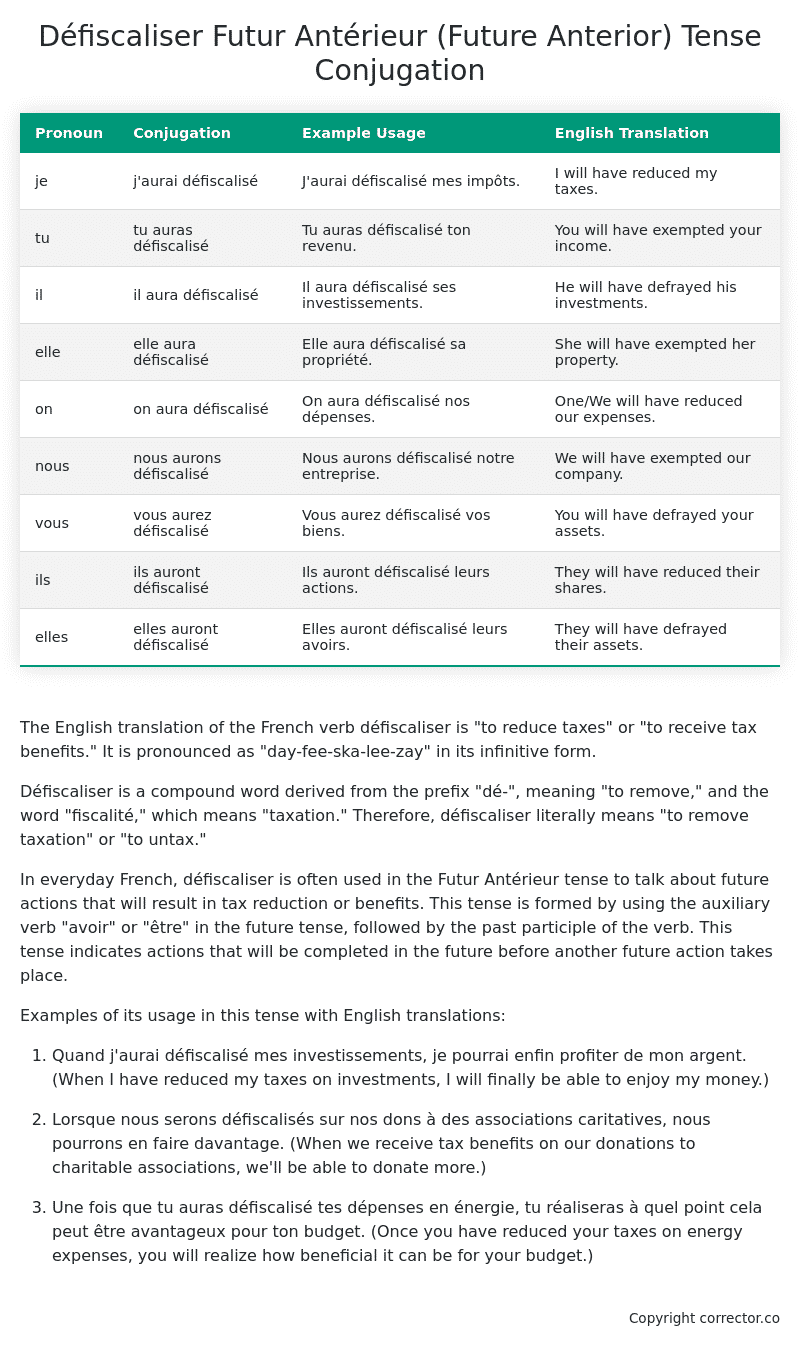Futur Antérieur (Future Anterior) Tense Conjugation of the French Verb défiscaliser
Introduction to the verb défiscaliser
The English translation of the French verb défiscaliser is “to reduce taxes” or “to receive tax benefits.” It is pronounced as “day-fee-ska-lee-zay” in its infinitive form.
Défiscaliser is a compound word derived from the prefix “dé-“, meaning “to remove,” and the word “fiscalité,” which means “taxation.” Therefore, défiscaliser literally means “to remove taxation” or “to untax.”
In everyday French, défiscaliser is often used in the Futur Antérieur tense to talk about future actions that will result in tax reduction or benefits. This tense is formed by using the auxiliary verb “avoir” or “être” in the future tense, followed by the past participle of the verb. This tense indicates actions that will be completed in the future before another future action takes place.
Examples of its usage in this tense with English translations:
-
Quand j’aurai défiscalisé mes investissements, je pourrai enfin profiter de mon argent. (When I have reduced my taxes on investments, I will finally be able to enjoy my money.)
-
Lorsque nous serons défiscalisés sur nos dons à des associations caritatives, nous pourrons en faire davantage. (When we receive tax benefits on our donations to charitable associations, we’ll be able to donate more.)
-
Une fois que tu auras défiscalisé tes dépenses en énergie, tu réaliseras à quel point cela peut être avantageux pour ton budget. (Once you have reduced your taxes on energy expenses, you will realize how beneficial it can be for your budget.)
Table of the Futur Antérieur (Future Anterior) Tense Conjugation of défiscaliser
| Pronoun | Conjugation | Example Usage | English Translation |
|---|---|---|---|
| je | j’aurai défiscalisé | J’aurai défiscalisé mes impôts. | I will have reduced my taxes. |
| tu | tu auras défiscalisé | Tu auras défiscalisé ton revenu. | You will have exempted your income. |
| il | il aura défiscalisé | Il aura défiscalisé ses investissements. | He will have defrayed his investments. |
| elle | elle aura défiscalisé | Elle aura défiscalisé sa propriété. | She will have exempted her property. |
| on | on aura défiscalisé | On aura défiscalisé nos dépenses. | One/We will have reduced our expenses. |
| nous | nous aurons défiscalisé | Nous aurons défiscalisé notre entreprise. | We will have exempted our company. |
| vous | vous aurez défiscalisé | Vous aurez défiscalisé vos biens. | You will have defrayed your assets. |
| ils | ils auront défiscalisé | Ils auront défiscalisé leurs actions. | They will have reduced their shares. |
| elles | elles auront défiscalisé | Elles auront défiscalisé leurs avoirs. | They will have defrayed their assets. |
Other Conjugations for Défiscaliser.
Le Present (Present Tense) Conjugation of the French Verb défiscaliser
Imparfait (Imperfect) Tense Conjugation of the French Verb défiscaliser
Passé Simple (Simple Past) Tense Conjugation of the French Verb défiscaliser
Passé Composé (Present Perfect) Tense Conjugation of the French Verb défiscaliser
Futur Simple (Simple Future) Tense Conjugation of the French Verb défiscaliser
Futur Proche (Near Future) Tense Conjugation of the French Verb défiscaliser
Plus-que-parfait (Pluperfect) Tense Conjugation of the French Verb défiscaliser
Passé Antérieur (Past Anterior) Tense Conjugation of the French Verb défiscaliser
Futur Antérieur (Future Anterior) Tense Conjugation of the French Verb défiscaliser (this article)
Subjonctif Présent (Subjunctive Present) Tense Conjugation of the French Verb défiscaliser
Subjonctif Passé (Subjunctive Past) Tense Conjugation of the French Verb défiscaliser
Subjonctif Imparfait (Subjunctive Imperfect) Tense Conjugation of the French Verb défiscaliser
Conditionnel Présent (Conditional Present) Tense Conjugation of the French Verb défiscaliser
Conditionnel Passé (Conditional Past) Tense Conjugation of the French Verb défiscaliser
L’impératif Présent (Imperative Present) Tense Conjugation of the French Verb défiscaliser
L’infinitif Présent (Infinitive Present) Tense Conjugation of the French Verb défiscaliser
Struggling with French verbs or the language in general? Why not use our free French Grammar Checker – no registration required!
Get a FREE Download Study Sheet of this Conjugation 🔥
Simply right click the image below, click “save image” and get your free reference for the défiscaliser Futur Antérieur tense conjugation!

Défiscaliser – About the French Futur Antérieur (Future Anterior) Tense
Construction
Common Everyday Usage Patterns
Interactions with Other Tenses
For example
Summary
I hope you enjoyed this article on the verb défiscaliser. Still in a learning mood? Check out another TOTALLY random French verb conjugation!


